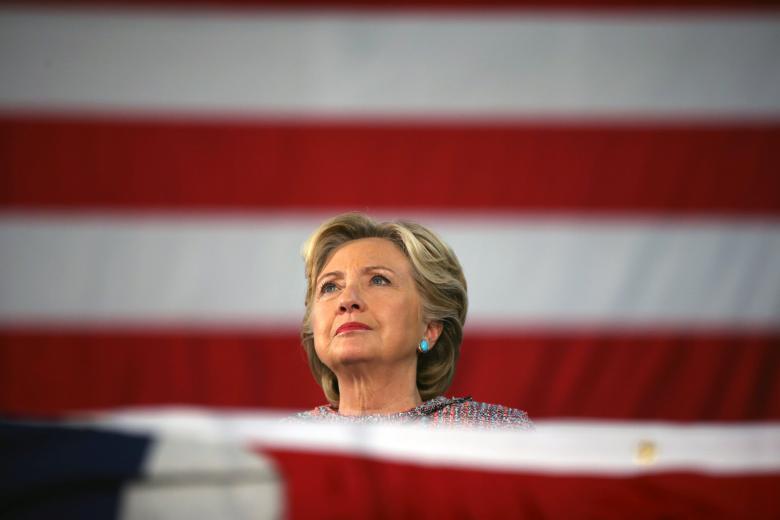Clinton opposition to Asia trade pact 'close call': hacked emails
NEW YORK: Hillary Clinton's campaign was worried about the "hard balance" she would need to strike as the presidential candidate prepared to oppose a Pacific trade pact championed by President Barack Obama that she once supported, according to emails published on Tuesday by WikiLeaks.
WikiLeaks released its latest batch of apparently hacked personal emails of Clinton campaign chair John Podesta with exactly four weeks left in the 2016 presidential campaign before the Nov. 8 election.
White House hopefuls have made trade a key theme of their campaigns, with the 12-nation Trans-Pacific Partnership (TPP), a prime target for criticism by both Democrat Clinton and Republican opponent Donald Trump.
In an Oct. 6, 2015, email the day after the Obama administration finalized the details of the TPP, Clinton speechwriter Dan Schwerin circulated a new draft of a statement the campaign was preparing about Clinton's position, according to WikiLeaks.
"This is indeed a hard balance to strike," Schwerin wrote in the email to a handful of top advisers, "since we don't want to invite mockery for being too enthusiastically opposed to a deal she once championed, or over-claiming how bad it is, since it's a very close call on the merits."
The next day, as she campaigned in Iowa, the first state to pick candidates during the nominating contest, the campaign released a statement from Clinton saying the pact did not meet the "very high" bar she had set to earn her support.
The Clinton campaign declined to verify the authenticity of the latest batch of Podesta emails released by WikiLeaks. Podesta told reporters on Tuesday that the Federal Bureau of Investigation notified him it is investigating the "criminal" hack of his emails published by WikiLeaks as part of a broader political hacking probe.
The US government last week formally accused Russia of hacking Democratic Party organizations in an effort to influence the presidential election, a charge Russia has denied. As a result, Clinton campaign officials and supporters have warned that such email releases could include fraudulent or misleading documents among genuine emails.
Clinton's October 2015 announcement on the TPP came just a week before the first debate in her primary race against U.S. Senator Bernie Sanders, a vocal opponent of the deal. Key Democratic constituencies, such as progressives and organized labor, have also criticized the pact.
Clinton had previously declined to say whether she would support the TPP, a main tenet of Obama's strategic pivot to Asia that began when she was his secretary of state from 2009 to 2013, explaining that she wanted to wait to assess the final negotiated terms.
"I accept the position we're taking but she has generally been more pro-trade than anti," Clinton strategist Joel Benenson responded to the draft from Schwerin. "While we're opposing this, don't we want to say something generally about ensuring American manufacturers can compete around the world?"
EARLY WARREN MEETINGS
Clinton's nascent campaign began meeting with advisers to US Senator Elizabeth Warren even before Clinton announced her second White House bid, according to the hacked emails.
In a January 2015 email sent three months before Clinton officially launched her campaign, Schwerin briefed close aides about a meeting with a longtime policy adviser to Warren, a firebrand leader of the Democratic Party's liberal wing.
Warren's team was concerned that Clinton would staff her campaign with economic advisers that were too closely associated with the centrist policies of her husband, former President Bill Clinton, such as those championed by his Treasury secretary, Robert Rubin.
The Warren adviser, Dan Geldon, "laid out a detailed case against the Bob Rubin school of Democratic policy makers, was very critical of the Obama administration's choices," Schwerin wrote.
Schwerin said he and Geldon went over a list of recommended hires that Warren had sent to Clinton. Geldon told him they would be "watching carefully" to see how Clinton staffed her campaign, Schwerin wrote.
"They seem wary - and pretty convinced that the Rubin folks have the inside track with us whether we realize it yet or not," Schwerin wrote of Warren's advisers. Geldon declined to comment on the email.
Schwerin also added that Geldon expressed "some flexibility on Glass-Steagall," a Depression-era law that prohibited commercial banks from engaging in risky trading activities that was repealed during Bill Clinton's administration. "Said too big too fail is the bigger issue," Schwerin wrote.
Many Democratic activists believe that reinstating Glass-Steagall would help prevent future financial crises such as the one that rocked the US economy in 2008. Warren has said that there are two ways to break up too-big banks, either based on size alone or by instituting a modern version of Glass-Steagall. She introduced a bill in the US.
Senate to reinstate a version of the law.
Clinton weighed supporting a new Glass-Steagall law but eventually rejected that route, announcing a risk-based approach for breaking up banks, according to an email WikiLeaks released on Monday.






